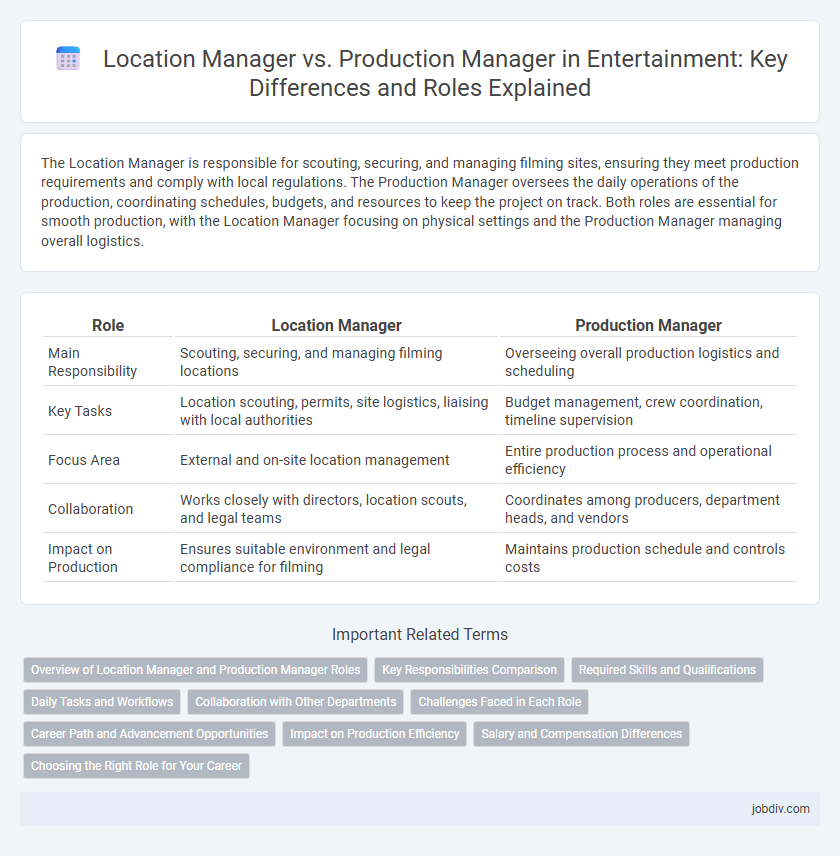The Location Manager is responsible for scouting, securing, and managing filming sites, ensuring they meet production requirements and comply with local regulations. The Production Manager oversees the daily operations of the production, coordinating schedules, budgets, and resources to keep the project on track. Both roles are essential for smooth production, with the Location Manager focusing on physical settings and the Production Manager managing overall logistics.
Table of Comparison
| Role | Location Manager | Production Manager |
|---|---|---|
| Main Responsibility | Scouting, securing, and managing filming locations | Overseeing overall production logistics and scheduling |
| Key Tasks | Location scouting, permits, site logistics, liaising with local authorities | Budget management, crew coordination, timeline supervision |
| Focus Area | External and on-site location management | Entire production process and operational efficiency |
| Collaboration | Works closely with directors, location scouts, and legal teams | Coordinates among producers, department heads, and vendors |
| Impact on Production | Ensures suitable environment and legal compliance for filming | Maintains production schedule and controls costs |
Overview of Location Manager and Production Manager Roles
Location Managers are responsible for scouting, securing, and managing filming sites, ensuring compliance with local regulations and coordinating logistics on location. Production Managers oversee the overall production process, managing budgets, schedules, and crew coordination to ensure the project stays on track. Both roles are crucial for efficient film and television production, with Location Managers focusing on site-specific logistics and Production Managers handling broader operational management.
Key Responsibilities Comparison
Location Managers oversee scouting, securing, and managing filming sites, ensuring logistical arrangements and permits comply with regulations. Production Managers coordinate overall production operations, including budgeting, scheduling, and resource allocation to maintain workflow efficiency. Both roles require strong organizational skills but differ as Location Managers focus on external site logistics, while Production Managers handle comprehensive production logistics and team coordination.
Required Skills and Qualifications
Location Managers require strong negotiation skills, in-depth knowledge of local regulations, and the ability to coordinate logistics for filming sites, often needing permits and community liaison expertise. Production Managers must possess excellent organizational skills, budget management proficiency, and experience in scheduling, overseeing resources, and coordinating between departments to ensure smooth production workflows. Both roles demand problem-solving abilities and adaptability but differ in their focus: location-specific operational knowledge versus overall production planning and execution.
Daily Tasks and Workflows
A Location Manager coordinates site logistics by securing permits, scouting locations, and managing on-site operations to ensure smooth daily shoots. A Production Manager oversees the overall production schedule, budget allocation, and resource coordination, monitoring progress to keep the project on track. Both roles require close collaboration with crews, but Location Managers focus on specific physical environments, while Production Managers handle broad organizational workflows.
Collaboration with Other Departments
Location Managers ensure seamless coordination with departments such as art, lighting, and transportation to secure and prepare shooting locations, optimizing logistical efficiency and aesthetic requirements. Production Managers collaborate extensively with all production units, including budgeting, scheduling, and post-production teams, to maintain workflow continuity and resource allocation. Their joint efforts are essential for synchronizing on-site operations with overall production goals, enhancing both creative execution and operational efficiency.
Challenges Faced in Each Role
Location Managers face challenges such as securing permits, managing site logistics, and navigating local regulations to ensure a seamless shoot. Production Managers must handle budgeting constraints, coordinate between departments, and maintain tight schedules to keep the production on track. Both roles demand strong problem-solving skills but differ in their operational focus and stakeholder interactions.
Career Path and Advancement Opportunities
Location Managers specialize in scouting and securing filming sites, offering expertise in logistics, permits, and local regulations, which can lead to advancement as Production Coordinators or Location Supervisors. Production Managers oversee the entire production process, managing budgets, schedules, and crew coordination, with career growth potential toward Line Producer or Executive Producer roles. Both roles provide distinct pathways, with Location Managers often transitioning into broader logistical management, while Production Managers pursue higher-level production oversight and strategic positions.
Impact on Production Efficiency
Location Managers optimize production efficiency by securing and managing suitable filming sites, minimizing logistical delays and location-related costs. Production Managers oversee the entire production schedule and resource allocation, ensuring timely coordination of personnel and equipment to stay within budget. Efficient collaboration between these roles significantly enhances overall production workflow and cost-effectiveness.
Salary and Compensation Differences
Location Managers typically earn between $50,000 and $80,000 annually, reflecting their specialized role in scouting and securing filming sites, which often demands extensive local knowledge and negotiation skills. Production Managers, overseeing the broader logistics of film production, command higher salaries ranging from $70,000 to $120,000 due to their critical responsibility in budgeting, scheduling, and coordinating multiple departments. Compensation differences result from the scope of responsibilities and the level of project management expertise required in each position within the entertainment industry.
Choosing the Right Role for Your Career
Location Managers specialize in scouting, securing, and managing filming sites, ensuring seamless logistics and permits for production schedules. Production Managers oversee overall project execution, coordinating budgeting, crew, and timelines to keep the production on track. Choosing between these roles depends on whether you prefer location-specific operational challenges or broader production oversight responsibilities.
Location Manager vs Production Manager Infographic

 jobdiv.com
jobdiv.com